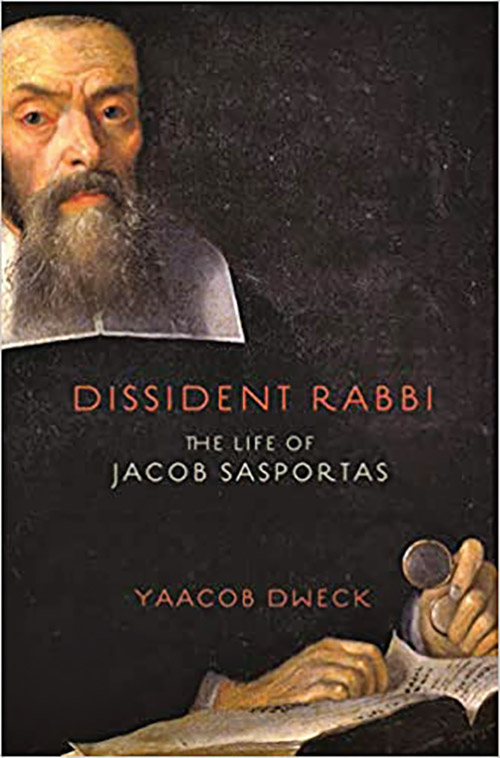
Reviewing: “Dissident Rabbi: The Life of Jacob Sasportas,” by Yaacob Dweck. Princeton University Press. 2019. English. Hardcover. 504 pages. ISBN-13: 978-0691183572.
Visit a Satmar community, and perhaps a quarter of all men and boys under 40 will be named Yoel. Do the same in a Lubavitch community, and a similar amount will be named Menachem Mendel, and for the women and girls, Chaya Mushka. They name their children after leaders who left a profound influence on them.
After reading Dissident Rabbi: The Life of Jacob Sasportas by Yaacob Dweck (Professor of History at Princeton University), my thought was that every Jewish family should name one of them their sons Yaakov in honor of Jacob Sasportas, who saved the Jewish people from one of the most significant religious mass hysteria events in history.
Rabbi Jacob Sasportas (c. 1610–1698) was a kabbalist, but is most prominently known as one of the primary opponents to the self-proclaimed messiah Sabbatai Zevi and his Sabbatian movement. One of the few voices of rationality during the irrational exuberance of the Sabbatian movement, Sasportas perhaps single-handedly saved countless people from joining the deviant movement.
While Sasportas was undoubtedly not the only one to protest against Sabbatai Zevi and the craze that lasted about 18 months, he has become the symbol of the resistance to the movement. Furthermore, those 18 months were indeed an out-of-control time where entire communities, including the rabbis and the congregants, joined along. People sold all of their possessions and were eagerly awaiting joining Sabbatai Zevi on his journey to Israel. There were but a handful of people who did not fall into the trap of Sabbatai Zevi and were vocal opponents of his redemption message.
Dweck has written an extremely dense, methodically detailed, and superbly researched book that details Sasportas’s life and efforts. Dweck’s book is based on the question of why a single individual would oppose a messianic movement as it was taking place. What was the source and the substance of Sasportas’s opposition to it? In other words, his book explores the truth-value of doubt within the rabbinic tradition as it was expressed by a man living amid the Sabbatean maelstrom.
Dweck has done a masterful job of looking at the nature of the Sabbatean crisis and the character of Sasportas’s response to it. One of his themes is that Sabbatai Zevi severely tested Sasportas’s deeply held conviction about the nature of the rabbinate and the character of rabbinic law.
Dweck extensively refers to Zizath Novel Zvi (The Fading Flower of Zvi), a work Sasportas wrote during the height of the Sabbatean messianic movement. There, Sasportas emphasized being suspicious of the Sabbatean movement, which was seen by many as a Sabbatean certainty.
The Sabbateans noted the importance of experience, revelation and prophecy as evidence that Sabbatai Zevi was the Messiah. To which Sasportas retorted that Halacha makes it eminently clear that a series of events are prerequisites for the proclamation of the Messiah, and Sabbatai Zevi lacked all of them. Sasportas relied heavily on the Rambam, and emphasized skepticism and the tight parameters of Halacha, as opposed to the irrational exuberance of the masses.
In the final chapter, Dweck writes how Rav Yoel Teitelbaum of Satmar found much in common with Sasportas. The Satmar Rav, who in his singular zeal against what he saw at the satanic influences of Zionism, saw Sasportas as a soulmate who was daring enough to disconnect from the masses of a heretical movement. He also saw Sasportas as someone who was faithful to the Rambam and rationalism in a fight against modern day idolatry.
In this remarkable biography, Dweck brings to light one of the most influential, and perhaps least known figures of the Sabbatai Zevi catastrophe. Sasportas was a man who almost single-handedly saved the Jewish people from a modern day Golden Calf episode. His is a story that is long overdue, but brilliantly detailed here.
Ben Rothke lives in New Jersey and works in the information security field. He reviews books on religion, technology and science. @benrothke













